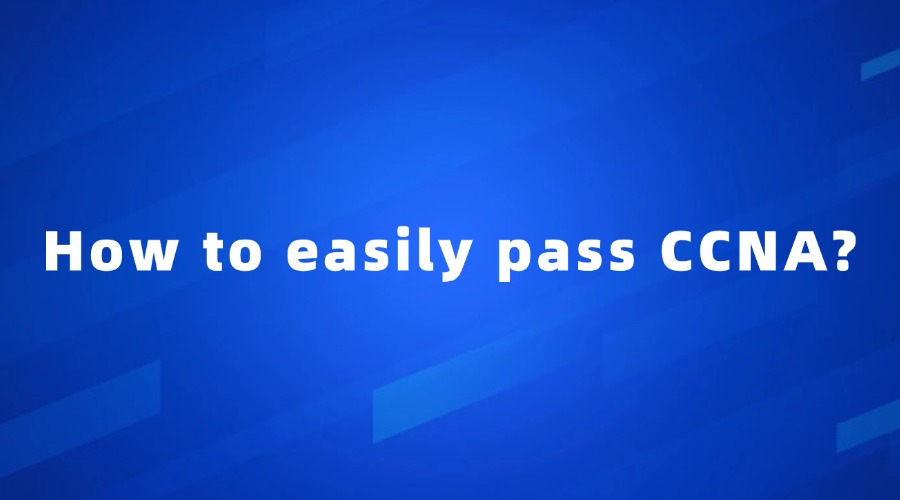How many exams are required for Cisco CCNP certification?
Update time:2024-10-16
The Cisco Certified Network Professional (CCNP) certification is an intermediate-level credential offered by Cisco, designed for professionals looking to enhance their networking skills. The CCNP certification covers multiple specialization tracks, each with its specific exam requirements. This article will explore the structure of the CCNP certification, including the number of exams required and their content.

Structure of the CCNP Certification
Currently, the CCNP certification is divided into several major specialization tracks, each focused on different networking domains. These tracks include but are not limited to:
CCNP Enterprise: Focuses on the design, implementation, and troubleshooting of enterprise networks.
CCNP Security: Centers on network security, including firewalls, VPNs, and other security technologies.
CCNP Data Center: Involves the design, implementation, and management of data centers.
CCNP Collaboration: Covers collaboration technologies such as video conferencing and voice solutions.
CCNP Service Provider: Targets the design and management of service provider networks.
Each CCNP track consists of two main components: a core exam and a specialization exam.
Exam Requirements
1. Core Exam
Each CCNP track has a core exam that covers a broad range of networking technologies relevant to that track. The core exam is designed to assess the candidate's understanding of fundamental networking concepts and their ability to solve complex networking problems. For example, in the CCNP Enterprise track, the core exam is 350-401 ENCOR (Enterprise Networking Core). This exam includes various topics such as network architecture, virtualization, network security, automation, and network infrastructure.
Here are the core exams for the different tracks:
CCNP Enterprise: 350-401 ENCOR
CCNP Security: 350-701 SCOR
CCNP Data Center: 350-601 DCCOR
CCNP Collaboration: 350-801 CLCOR
CCNP Service Provider: 350-501 SPCOR
2. Specialization Exam
In addition to the core exam, candidates must pass at least one specialization exam. The choice of specialization exam depends on the candidate's career goals and interests. For example, in the CCNP Enterprise track, candidates can choose the 300-410 ENARSI (Enterprise Advanced Routing and Services) exam, which focuses on advanced routing and services such as BGP, OSPF, and EIGRP.
Each CCNP track offers a range of specialization exams, allowing candidates to dive deeper into specific technologies within their chosen field. Some examples include:
CCNP Enterprise: 300-410 ENARSI, 300-420 ENSLD, 300-425 ENSD, 300-430 ENWLS
CCNP Security: 300-710 SNCF, 300-715 SISE, 300-720 SESA
CCNP Data Center: 300-610 DCID, 300-615 DCIT, 300-620 DCAC, 300-625 DCME
CCNP Collaboration: 300-801 CLCOR, 300-810 CLICA, 300-815 CLACM, 300-820 CLCNF
CCNP Service Provider: 300-510 SPRI, 300-515 SPVI, 300-520 SPNGN1, 300-535 SPRI
Contact me immediately to get the golden key helping you fast express your certificate.
Preparation Paths
To successfully obtain the CCNP certification, candidates need a deep understanding of the technologies relevant to their chosen track and practical experience to reinforce their knowledge. Below are some effective preparation paths and resources:
1. Study Materials and Courses
Cisco offers a wealth of study resources, including textbooks, online courses, and hands-on labs. Additionally, many educational institutions and training centers provide CCNP certification courses and practice exams to help candidates prepare effectively.
2. Hands-On Practice and Labs
Hands-on practice is crucial for mastering networking technologies. Candidates can build their own lab environments or use virtual labs to practice configurations and troubleshooting. This not only aids in understanding theoretical concepts but also enhances problem-solving skills.
3. Joining Study Communities
Participating in study groups or forums can provide additional resources and support. Engaging with other candidates and professionals can offer valuable exam tips and shared experiences.
Conclusion
The CCNP certification requires candidates to pass a core exam and at least one specialization exam. The core exam assesses a candidate’s overall understanding of networking technologies, while the specialization exam allows them to explore specific areas in greater depth. This certification validates professional knowledge and skills in specific areas and can significantly boost career prospects in the networking industry. With thorough preparation and hands-on practice, candidates can successfully achieve CCNP certification and take an important step in their professional journey.
I'm your man who have the 100% valid dumps , buy it now for 50% off to clear your exam!
Click it ↓↓

Structure of the CCNP Certification
Currently, the CCNP certification is divided into several major specialization tracks, each focused on different networking domains. These tracks include but are not limited to:
CCNP Enterprise: Focuses on the design, implementation, and troubleshooting of enterprise networks.
CCNP Security: Centers on network security, including firewalls, VPNs, and other security technologies.
CCNP Data Center: Involves the design, implementation, and management of data centers.
CCNP Collaboration: Covers collaboration technologies such as video conferencing and voice solutions.
CCNP Service Provider: Targets the design and management of service provider networks.
Each CCNP track consists of two main components: a core exam and a specialization exam.
Exam Requirements
1. Core Exam
Each CCNP track has a core exam that covers a broad range of networking technologies relevant to that track. The core exam is designed to assess the candidate's understanding of fundamental networking concepts and their ability to solve complex networking problems. For example, in the CCNP Enterprise track, the core exam is 350-401 ENCOR (Enterprise Networking Core). This exam includes various topics such as network architecture, virtualization, network security, automation, and network infrastructure.
Here are the core exams for the different tracks:
CCNP Enterprise: 350-401 ENCOR
CCNP Security: 350-701 SCOR
CCNP Data Center: 350-601 DCCOR
CCNP Collaboration: 350-801 CLCOR
CCNP Service Provider: 350-501 SPCOR
2. Specialization Exam
In addition to the core exam, candidates must pass at least one specialization exam. The choice of specialization exam depends on the candidate's career goals and interests. For example, in the CCNP Enterprise track, candidates can choose the 300-410 ENARSI (Enterprise Advanced Routing and Services) exam, which focuses on advanced routing and services such as BGP, OSPF, and EIGRP.
Each CCNP track offers a range of specialization exams, allowing candidates to dive deeper into specific technologies within their chosen field. Some examples include:
CCNP Enterprise: 300-410 ENARSI, 300-420 ENSLD, 300-425 ENSD, 300-430 ENWLS
CCNP Security: 300-710 SNCF, 300-715 SISE, 300-720 SESA
CCNP Data Center: 300-610 DCID, 300-615 DCIT, 300-620 DCAC, 300-625 DCME
CCNP Collaboration: 300-801 CLCOR, 300-810 CLICA, 300-815 CLACM, 300-820 CLCNF
CCNP Service Provider: 300-510 SPRI, 300-515 SPVI, 300-520 SPNGN1, 300-535 SPRI
Contact me immediately to get the golden key helping you fast express your certificate.
Preparation Paths
To successfully obtain the CCNP certification, candidates need a deep understanding of the technologies relevant to their chosen track and practical experience to reinforce their knowledge. Below are some effective preparation paths and resources:
1. Study Materials and Courses
Cisco offers a wealth of study resources, including textbooks, online courses, and hands-on labs. Additionally, many educational institutions and training centers provide CCNP certification courses and practice exams to help candidates prepare effectively.
2. Hands-On Practice and Labs
Hands-on practice is crucial for mastering networking technologies. Candidates can build their own lab environments or use virtual labs to practice configurations and troubleshooting. This not only aids in understanding theoretical concepts but also enhances problem-solving skills.
3. Joining Study Communities
Participating in study groups or forums can provide additional resources and support. Engaging with other candidates and professionals can offer valuable exam tips and shared experiences.
Conclusion
The CCNP certification requires candidates to pass a core exam and at least one specialization exam. The core exam assesses a candidate’s overall understanding of networking technologies, while the specialization exam allows them to explore specific areas in greater depth. This certification validates professional knowledge and skills in specific areas and can significantly boost career prospects in the networking industry. With thorough preparation and hands-on practice, candidates can successfully achieve CCNP certification and take an important step in their professional journey.
I'm your man who have the 100% valid dumps , buy it now for 50% off to clear your exam!
Click it ↓↓














